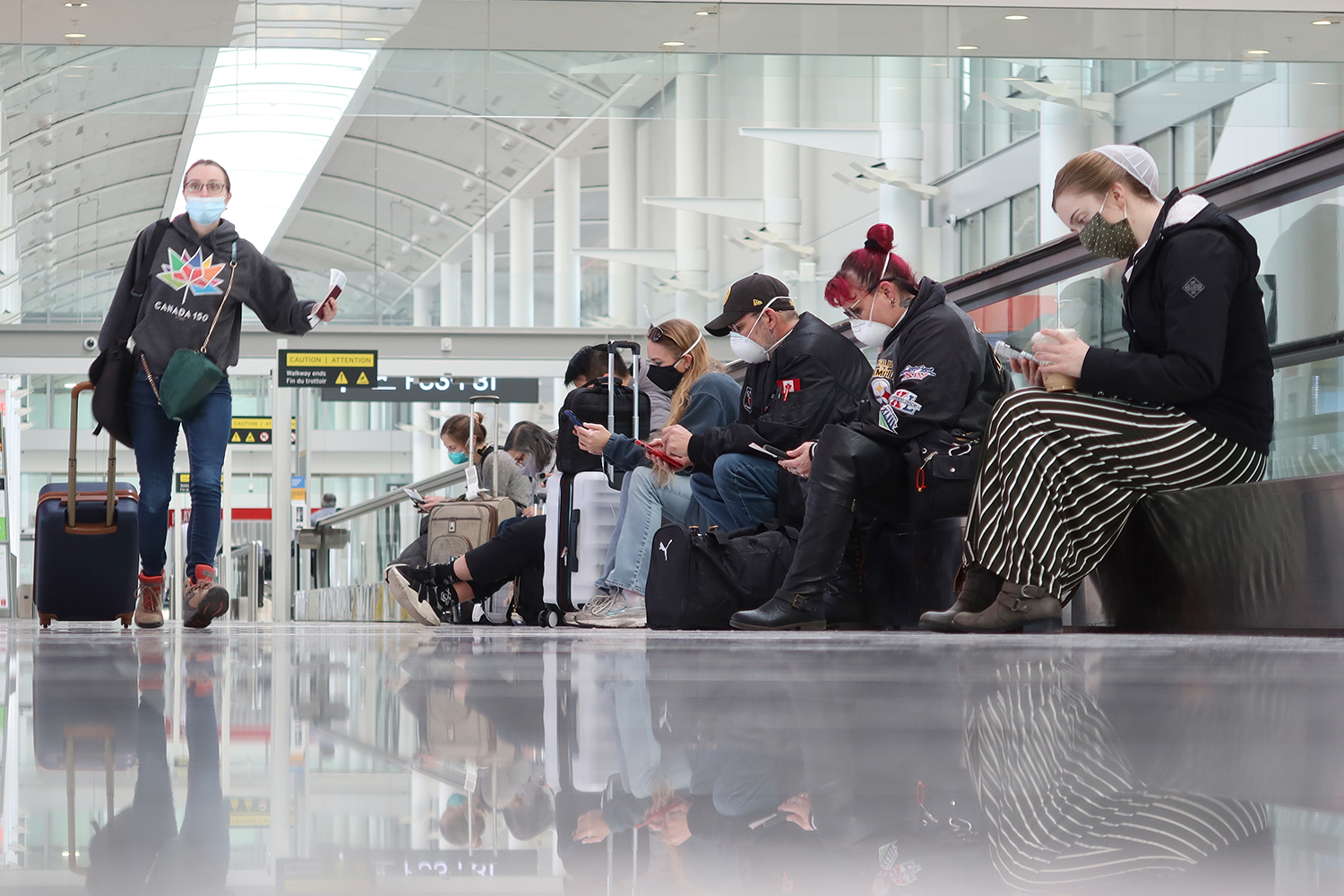Canadian Airports Are a Nightmare. Here’s What You Need to Know About Delays

At Toronto Pearson International Airport, Canada’s busiest airport, wait times these days can be several hours—forcing travellers to make small talk in security lines, at the gate or in the confines of the aircraft with fellow passengers who, like themselves, want to take to the skies after a long pandemic slump in travel.
The situation at Pearson is so dire that Toronto Mayor John Tory even spoke up after former NHL player Ryan Whitney blasted the airport, calling it “the worst place on earth” in a series of recent tweets posted after he spent at least six hours in chaotic lines.
“The situation at the airport is not acceptable as it presently is,” said Tory at a press conference on Tuesday. “It’s just not acceptable.”
The delays are caused by pent-up travel demand, lingering public health measures—including Covid screening questions at check-in and random testing for travellers arriving from international destinations—and a severe shortage of workers who load luggage, screen passengers at security and conduct customs.
According to federal government data, officers screened 121,000 passengers at Canada’s eight largest airports on May 1 this year, compared to just 15,000 in 2021. Travelling before the pandemic was, in hindsight, a breeze—it would take an officer around 30 seconds to process an international arriving passenger, but the process now takes up to two minutes. (As you know, the difference between making or missing your flight often comes down to mere minutes.)
And, after laying off workers en masse during the pandemic, airports are scrambling to hire and train workers fast enough to keep up with soaring demand now that summer is right around the corner.
Will things get better?
Under mounting pressure from travellers, airlines and airports, the federal government has invested $330 million in the Canadian Air Transportation Security Authority, or CATSA. A portion of it will go towards hiring and fast-tracking the training of 400 screening officers to be on the job by the end of the month.
But Dave Flowers, a district president of the International Association of Machinists and Aerospace Workers, or IAMAW, a trade union that represents nearly 4,000 airport security workers in B.C. and Ontario, has his concerns. “Fast-track training is great because it will expedite people getting through the process quicker, but we hope it doesn’t come at the risk of employees’ health and safety.”
Flowers also adds that Transport Canada’s commitment to hiring 400 new officers doesn’t necessarily mean all of them will make it through training. “In some cases, 50 or 60 per cent of them are not making it through for one reason or another,” says Flowers. “They are either not passing the training, or they are passing the training and then getting another job elsewhere in the airline world.”
With an average of more than 30,000 international air travellers arriving in Canada every day—a number expected to increase this summer—there will be far fewer officers per traveller this season.
The Greater Toronto Airports Authority, or GTAA, which operates Pearson, says one way to help travellers move along is to temporarily pause random Covid screening—something the federal government agreed to on Friday. The government said it will temporarily suspend random testing at airports until July 1 when it will be moved off-site.
“There is no evidence to support extending this kind of random testing of Covid in the airport to be effective in preventing transmission,” says Xiaolin Wei, a professor of global health policy at the University of Toronto. “We get more transmission within Canada rather than from other parts of the world to Canada.”
Tips for travellers
While existing Covid measures and staffing shortages are beyond your control, we’ve rounded up some tips for air travellers who want to get to their destination with as few hiccups—and as little small talk—as possible.
To avoid long lineups and get you through the screening process faster, the GTAA recommends:
- Arriving at the airport at least two hours ahead of time for domestic flights and three hours for international flights—a larger time frame than the standard one to 1.5 hours previously recommended for domestic and international trips
- Having your boarding pass out and ready to be inspected by the officer
- When it comes to security checks, save time by removing your outerwear and ensure phones, tablets and laptops are out of their cases and can be powered on
- Making sure all liquids, aerosols and gels are in containers no larger than 100 mL, with the exception of hand sanitizer that can be up to 355 mL, and placed in a clear, resealable plastic bag
And when you’re preparing for a trip, you can:
- Fill out the ArriveCAN submission ahead of time, which is required for all travellers leaving and entering Canada
- Book your flight outside of peak times. Pearson’s busiest time is Monday morning for departing flights and Thursday to Sunday for inbound flights, while popular departure times are early morning, late afternoon and early evening. Vancouver International Airport is experiencing its busiest arrival times at 7 a.m., 11 a.m. and 4 p.m. and its busiest departure times at 8 a.m. 9 a.m. and 1 p.m.
- Opt for a direct flight when booking your trip. With the number of flights delayed up by 275 times in April 2022 compared to April 2019 at Pearson, you don’t want to risk missing your connecting flight because of a delay. Direct flights are typically more expensive, but can save you a headache
- Take advantage of your Nexus membership if you have it, which lets pre-approved passengers fly through customs for trips between the U.S. and Canada. But tough luck if you’re considering getting Nexus now—the application backlog sits at around 300,000 due to Covid-related Canada Border Services Agency office closures
- Pay for travel insurance—and check to see if it covers flight and booking cancellations and interruptions. Data from RATESDOTCA shows Canadian demand for travel insurance has shot up in the past year, with trip cancellation insurance sales up by nearly 1,200 per cent
